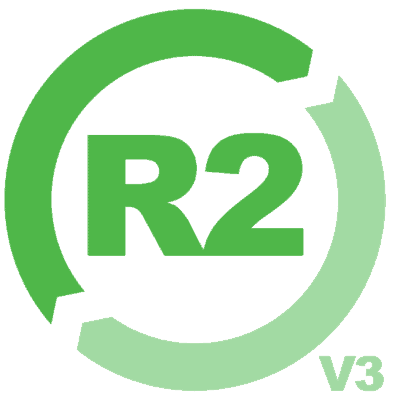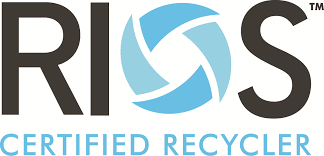With the cost of new computer equipment dropping each year, your used devices are worth less and less. The resale market for used equipment in the United States is extremely low due to regular product innovation. Simply put, older machines regularly do not fit the system requirements needed to optimally run the newest software programs. Machine upgrades have become less of a priority for most organizations, given that they can purchase a new machine cost-effectively. However, Magnolia Data Solutions recognizes that some equipment when in working may retain some portion of its residual value. In these situations, MDS may credit a portion of the residual value back to the customer to cover recycling costs or purchase out right from the client.
In many states, certain electronics like Cathode Ray Tubes are considered hazardous waste and cannot be thrown away in landfills. They contain lead and other ground water contaminating chemical compounds that must be properly recycled.
R2 Recyclers have an obligation to ensure that what they’re recycling ends up being disposed of in environmentally friendly ways. Choosing a Recycler without R2 means its entirely possible that they simply send everything to a landfill.
Hard Drives could be stolen by theives, scanned for their information and sold to spammers or hackers leaving you responsible for improperly disposing of sensitive client/employee data. Especially if they have their identities stolen or bank accounts hacked.
Yes there are. Statutes like the Gramm-Leach-Bliley Act, the Health Insurance Portability and Accountability Act (HIPPA), the Fair Credit Reporting Act, and the Federal Trade Commission Act may require you to provide reasonable security for sensitive information. To find out more, visit www.ftc.gov/privacy.
Yes, for customers who request a Certificate of Destruction we will generate one complete with the serial numbers of all drives that were shredded.
We use an Amerishred HD 750 to pulverize and completely destroy any chance of data being recovered from your media. Upon request we can provide a destruction certificate with serial numbers which shows which drives were destroyed.
With the cost of new computer equipment dropping each year, your used devices are worth less and less. The resale market for used equipment in the United States is extremely low due to regular product innovation. Simply put, older machines regularly do not fit the system requirements needed to optimally run the newest software programs. Machine upgrades have become less of a priority for most organizations, given that they can purchase a new machine cost-effectively. However, Magnolia Data Solutions recognizes that some equipment when in working may retain some portion of its residual value. In these situations, MDS may credit a portion of the residual value back to the customer to cover recycling costs or purchase out right from the client.
NOTICE OF VIOLATION as issued by the Resource Conservation and Recovery Act. Failure to correct the alleged violations cited required by this NOTICE, may result in the assessment of penalties, not to exceed $27,500 per violation pursuant to Section 3008 of Resource Conservation and Recovery Act (RCRA) of 1976, 42 U.S.C. § 6928.
It is estimated that of the approximately 250,000,000 tons of solid waste generated annually in the United States, around 5% is classified as e-waste. Of this, only an estimated 10% to 18% of electronics are recycled (according to WellHome’s 2011 Infographic). Magnolia Data Solutions efforts help change this for the good of our local and global environments.
This number does not represent a permit, certification, or any kind of EPA approval of their activities.EPA assigns an EPA Waste Generator Identification Number to companies that handle regulated wastes. Not all electronics or management processes are regulated by EPA. As a result, not all electronics recyclers are required to have an EPA ID number. The Identification Number is used to track regulated wastes sent from one management facility to another. For more information on Waste Generator Identification Numbers, visit the EPA Waste ID Number page.
Each recycler may follow different practices, and you will need to decide which electronics recycler will do the job you need done, offer the services you require, and minimize your environmental and informational liability at an acceptable cost. Organizations should seek recyclers that are third-party certified to an accredited electronics recycler certification program. EPA encourages use of electronics recyclers certified to standards that require safe handling of used electronics and adherence to high environmental standards.
R2 and e-Stewards are the two electronic recycling standards. The EPA encourages you to find out if the recycler you are considering has been certified by an accredited, independent certification auditor to standards that require safe and environmentally protective handling of used electronics. You can view certified facilities across the world at http://www.r2solutions.org/certified/electronic-recyclers-with-r2-certified-facilities/
Lead, mercury, cadmium, and brominated flame retardants are among the substances of concern in electronics. These substances are included in the products for important performance characteristics, but can pollute and contaminate the environment if the products are not properly managed at end of life.
Yes. Our normal business hours are currently 9am – 5pm Mon – Fri. Please call ahead so that we know that you will be coming.
In many states, certain electronics like Cathode Ray Tubes are considered hazardous waste and cannot be thrown away in landfills. They contain lead and other ground water contaminating chemical compounds that must be properly recycled.
R2 Recyclers have an obligation to ensure that what they’re recycling ends up being disposed of in environmentally friendly ways. Choosing a Recycler without R2 means its entirely possible that they simply send everything to a landfill.




